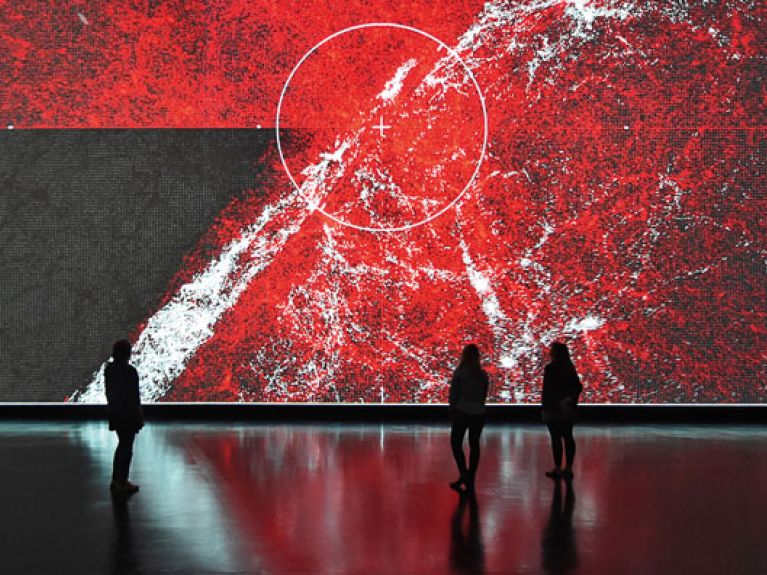Networked art
“Globale” at the Karlsruhe Zentrum für Kunst und Medientechnologie (ZKM) provides a unique forum for exchange.

Globalisation may well seem like this to many people: a cloud which will soon totally envelop us. And because it is constantly coming closer, it becomes diffuse, and its already frayed contours fade from view. The fact that an artificially created cloud was hovering in the atrium of the Karlsruhe Zentrum für Kunst und Medientechnologie (ZKM) at the opening of the exhibition and event series “Globale” was more than just a technical gimmick or an echo of modern feasibility fantasies. With this Cloudscapes the German climate engineering company Transsolar and the Japanese architect Tetsuo Kondo had produced a symbol for “Globale” which was simultaneously quite concrete. And it is in this field of tension between the concrete and the symbolic that “Globale”, which lasts for 300 days, steers towards its goal: to render the trailblazing and disruptive trends of the 21st century tangible in a multi-perspectival way.
What already characterised the excessive world exhibitions of the 19th century and the Biennales and Documentas of the 20th century which pointed far beyond the field of art, is being carried to an extreme by ZKM director Peter Weibel and his team: less than ever before do art and technology, knowledge and aesthetics, representation and production exist separately. The curatorial programmes of “Globale” bids farewell to the myth of the autonomy of art and the contemplative bourgeois appreciation of art. With resonant terms like Renaissance 2.0, Anthropocene, Digital Revolution or Exo-Evolution, it enters those cloudy borderline regions where orientation points are rare and ascriptions uncertain. For example, the artist HA Schult travelled from Paris to Beijing in a hybrid car and while doing so completed his famous “bio-kinetic images”, in keeping with the motto “nature paints itself”. His journey can be followed in the exhibition room ZKM_Subraum. The group exhibition “Infosphere” addresses the theme of digital data as new lifeworlds and involves not only artists like the Japanese Ryoji Ikeda and his sound-image worlds, but also the Chaos Computer Club and the netzpolitik.org blog. Sociologist Bruno Latour, co-founder of the Akteur-Netzwerk-Theorie, curated the exhibition “Reset Modernity!” which is intended to highlight the role of the local in the global and which has a multimedia section where visitors can contribute their own ideas about modernity.
Interrelation, nexus, reciprocity, hybridisation, technology as art and culture, or art and culture as technology – these are the major reference points of “Globale”, which on the surface resembles a futurological cabinet of curiosities that is actually analysing the present. Indirectly, the exhibition tour leads us away from the image of man as “individual” and sovereign pride of creation and towards man as “dividuum”: a shaping and, in equal measure, shaped participatory creature. ▪

